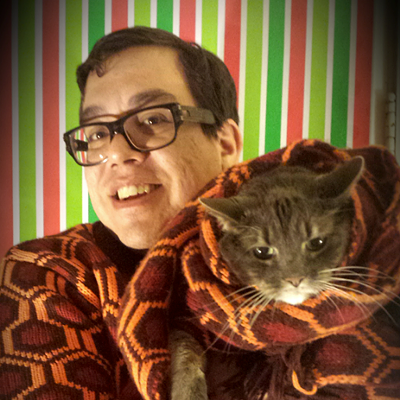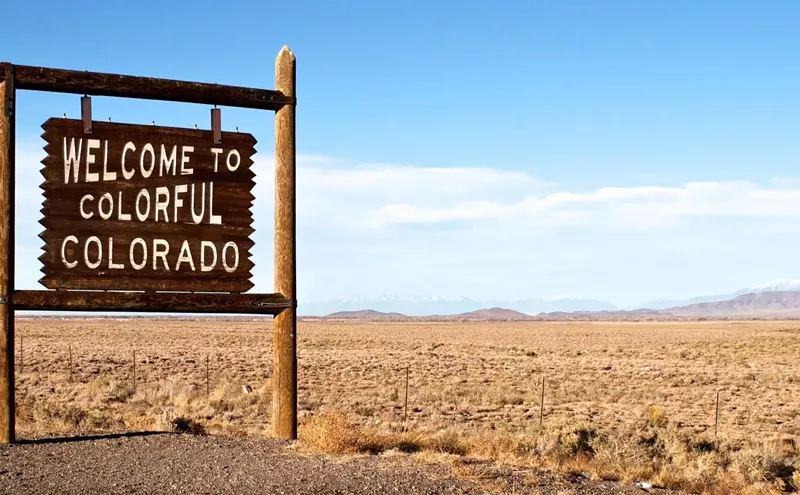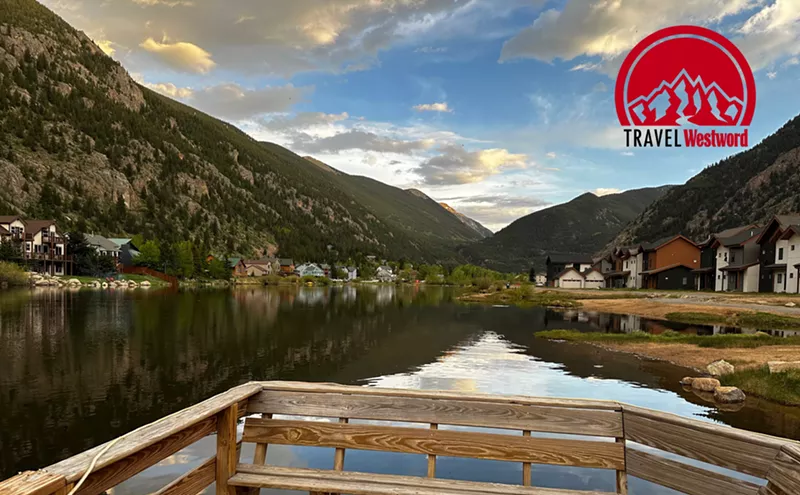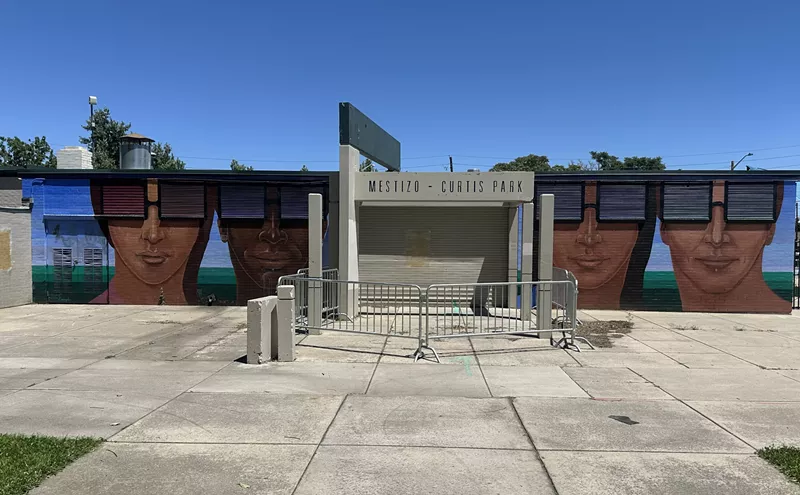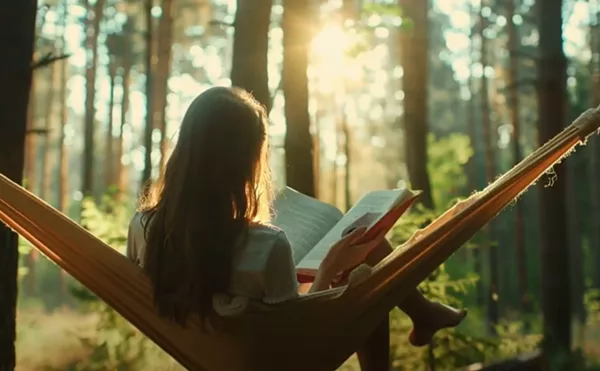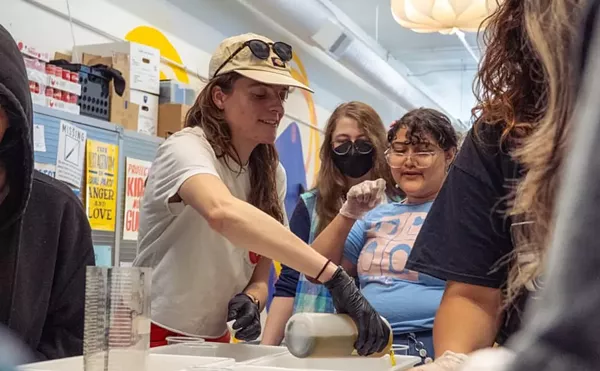Director Rachel Talalay Talks Tank Girl and a Career of Dreams and Nightmares
Director Rachel Talalay will descend upon the Alamo Drafthouse Friday to share and discuss her 1995 cult gem Tank Girl with an audience that will fill up on her memories and a special three-course dinner from Alamo executive chef Seth Rexroad. Talalay, a mainstay in John Waters’s ’80s staples and the Nightmare...
By Keith Garcia
July 28, 2016
What happens in Denver matters — Your support makes it possible.
We’re aiming to raise $17,000 by August 10, so we can deepen our reporting on the critical stories unfolding right now: grassroots protests, immigration, politics and more.
Progress to goal
$17,000
$4,425

Audio By Carbonatix
[
{
"name": "GPT - Billboard - Slot Inline - Content - Labeled - No Desktop",
"component": "23668565",
"insertPoint": "2",
"requiredCountToDisplay": "2"
},{
"name": "STN Player - Float - Mobile Only ",
"component": "23853568",
"insertPoint": "2",
"requiredCountToDisplay": "2"
},{
"name": "Editor Picks",
"component": "17242653",
"insertPoint": "4",
"requiredCountToDisplay": "1"
},{
"name": "Inline Links",
"component": "18838239",
"insertPoint": "8th",
"startingPoint": 8,
"requiredCountToDisplay": "7",
"maxInsertions": 25
},{
"name": "GPT - 2x Rectangles Desktop, Tower on Mobile - Labeled",
"component": "24956856",
"insertPoint": "8th",
"startingPoint": 8,
"requiredCountToDisplay": "7",
"maxInsertions": 25
},{
"name": "Inline Links",
"component": "18838239",
"insertPoint": "8th",
"startingPoint": 12,
"requiredCountToDisplay": "11",
"maxInsertions": 25
},{
"name": "GPT - Leaderboard to Tower - Slot Auto-select - Labeled",
"component": "17676724",
"insertPoint": "8th",
"startingPoint": 12,
"requiredCountToDisplay": "11",
"maxInsertions": 25
}
]
Director Rachel Talalay will descend upon the Alamo Drafthouse Friday to share and discuss her 1995 cult gem Tank Girl with an audience that will fill up on her memories and a special three-course dinner from Alamo executive chef Seth Rexroad.
Talalay, a mainstay in John Waters’s ’80s staples and the Nightmare on Elm Street films, snatched the opportunity to bring cult-comic-book heroine Tank Girl to the big screen. But doing so proved disastrous for the director, who watched the film fail amid studio mishandling and an audience that showed up twenty years too late to her passion project. Not only was Tank Girl’s failure unfairly placed on Talalay’s shoulders, but Talalay consequently saw fewer opportunities to make films.
She rose from the ashes of her film career and found a place in television, where her hard work and vision has paid off; Talalay is behind prestigious fan hits like Doctor Who and Sherlock.
We caught up with Talalay ahead of her trip to the Drafthouse to talk about feminism in Hollywood and her stint in TV, and to revisit the film that put her name on the map and, for better or for worse, changed the trajectory of her career.
Westword: What kind of a movie watcher were you when you were growing up?
Rachel Talalay: I was a real varied movie watcher. I loved old Hollywood movies: Howard Hawks films, MGM musicals, all the classics. I was a big Fred Astaire and Gene Kelly fan. I loved contemporaries, like Nicolas Roeg, and with him I became a more populist movie-goer. This was the late ’60s and ’70s, when I was a kid, and it was an amazing time for independent movies; I loved The Last Picture Show and Easy Rider. This was when you didn’t have the option of being so selective, before video stores and streaming.
Did you have a taste for horror films, too, back then?
No, and this has been so misquoted. I wasn’t a huge horror fan when I was young, and that’s the important part, because I was so scared as a kid! This often gets twisted as, 'Talalay says she doesn’t like horror films,' which drives me crazy! I only bring it up because I was so engaged in the Nightmare on Elm Street films. I had lot of things that I was scared of as a kid that I could finally bring into the creative process.
I think there’s a period of time when you’re young when you’re incredibly susceptible to horror, and unless you embrace the notion of 'I’m going to attack that fear and be braver than it and learn to love it,' then you stay scared. Even in college, Carrie scared me to death! At the same time, though, I loved Kubrick and his Clockwork Orange. And I was frightened to see The Shining, but when I did, I loved it.
You mentioned Nicolas Roeg. What do you think of his dip into the horror genre with Don’t Look Now?
Oh, absolutely, absolutely terrifying! I often use that film when I talk about examples of really subtle ways to ring horror out of things with visuals and textures. It’s genius. Another genius at that skill was Wes Craven. I think his original Nightmare on Elm Street was great for building anticipation and giving it a really rewarding payoff.
Growing up, was there any film in particular that you latched onto?
No, but that's like asking 'What’s your favorite film?' That’s such a killer, because my tastes are so varied. If you look at my career, not a lot of people can claim Hairspray and Nightmare on Elm Street in the same breath. I think that Tank Girl is the amalgamation of that craziness. My love of musical numbers is what got me obsessed to get that 'Let’s Do It' number in that film. I just delight in all of that material and paying homage to it. Speaking of, I love that the Coen Brothers got a little Astaire/Kelly tribute into Hail, Caesar! That was just great.
Did watching films inspire you to get into the business? Growing up then, you could probably count the number of female directors on one hand.
Watching movies definitely made me want to get into the film business; I knew that from high school. I just wasn’t sure what exactly I wanted to do in that world. I didn’t really think about female role models, and I didn’t think about the barriers of the era. I just moved forward with my life. It was a real long time until I saw those barriers, which I’ve only recently been able to talk about. Until I did Tank Girl, I was just kicking the glass ceiling, thinking I wasn’t going to be stopped by barriers, and then, suddenly, I was. After that, I was in denial that it was happening and was told to shut up if I ever wanted to work again. But as a kid, I was encouraged to go into the sciences, to do what I wanted to do. I was watching the birth of feminism back then and got into Yale during the first ten years that they took women, which is shocking to most people, who thought that Yale was co-ed forever.
Tell us how you met John Waters and fell into his wily crew of characters, and how that brought you into the film world.
I grew up in Baltimore, and I got my degree in math at Yale. I was working at Johns Hopkins after I graduated as a computer programmer when I saw a casting call for [Waters's] new film Polyester. Now, at that point, I had been thinking of going to film school so that I could break into the business, but I didn’t know how to do that. So when I saw that casting call in the city paper, I wrote them a note asking if I could make coffee for the production, which I barely knew how to do (laughs), and whatever else they needed, because I didn’t even know that was what you called a production assistant. They called me and basically said, 'If you can work for free and have a car, you’re hired.' I used that experience to meet more people, and eventually moved to Los Angeles. At the time I really wanted to go work for Roger Corman; I was attracted to the cult-y movies anyway, and I knew that working for him was kind of a paid film school. I was on a mission to do that, and I did. Working on Polyester was important, though, because that’s where I met New Line Cinema, and that’s where all of the opportunities were.
And you stuck with John through Hairspray and Cry-Baby.
Yes. Because I went from Polyester to working on Hairspray, I went from being a PA to a producer and learning everything I could. My eyes were just wide open on that film, learning about filmmaking and working with this amazing group of people. I’d seen his cult films, but I had absolutely no idea what I was walking into. It was incredible, and John is endlessly entertaining. You couldn’t do anything but spend your whole time admiring him.
I was at New Line when they picked up Hairspray. They asked if I’d go and produce it, and I said, "I don’t know how this group is going to feel about me stepping into that role, I was just a PA the last time!" But I called up John and told him, and he said, "Absolutely! If they’re going to send a producer, it better be you." So I just showed up and asked what I could do to make Hairspray better and be their support system. It worked well, and John and I have been close ever since.
And Hairspray became John’s most accessible and satisfying film with your support.
It was incredibly fun behind the scenes, but it was incredibly hard at the same time. You can’t tell that we made it for less than $2.5 million, and I don’t know how we did that and how we got the period so right. When you think of the volume of locations, props, sets, dance numbers and the music, it’s amazing. We had such a loving, supportive group, and it was really John’s passion project. I think that was the biggest piece that kept everyone giving their all. When it was done, the biggest fear John had was when they wanted to rate it PG. He was terrified that his audience would rebel. With that rating, he was afraid he wouldn’t be embraced the same way he had been. That was his biggest stress, other than when Divine passed away right as it released, which was devastating.
But when it was a hit, was that satisfying?
It actually wasn’t a commercial hit when it came out. It was critically acclaimed and found his cult fans, but it just sort of disappeared until the Broadway musical version came out so many years later. Then New Line remade it as the musical version. But in a million, million, million years, you couldn’t imagine that back when we were making the original for no money, that twenty years later it would be remade with John Travolta in the Divine role and be such a popular film. I mean, maybe in John’s imagination only, but you couldn’t have made that up with anyone else.
In the early days of New Line Cinema, especially given their relationship with John Waters, it seemed like an 'anything goes' kind of studio. What did you learn from that kind of environment?
Bob Shaye (then New Line head) was and is a real maverick, and in those days, New Line was distributing obscure European art films and stuff like Sam Raimi’s The Evil Dead. They really had both sides going on. They had gotten started with Reefer Madness and Werner Herzog’s films and walking between the cult-y worlds of John and Sam and the pretentious art films with a capital A. It was perfect for me. Bob really made the films that he wanted to make, is an incredibly astute businessman and also a total film lover interested in both sides of the coin. He aimed to do a wide variety of things, and do it all by not working within the scope of the studio system in those days.
With Bob and his maverick attitude and ability to succeed outside the normal studio system, do you feel like your role there as a woman was a non-issue?
Well, at the time I was there, the head of production was Sara Risher, so that was pretty significant. It wasn’t until I left New Line later that I started to feel some of those barriers come up.
What was it like working with Wes Craven back when he was about to make quite the name for himself?
Wes was a very intellectual guy, nothing like what you’d expect from an out-there shlockmeister. He was erudite and well read, but very, very smart with his take on horror. He just had an amazing understanding of it. I didn’t have a huge amount of time talking to him; I was just New Line’s accountant at the time and worked my way into an assistant production manager on that first film. But he was an impressive character who could’ve been your English teacher. Bob loved horror, too, and he picked up Nightmare because he responded to Wes and his script so strongly. And talk about terrifying! Reading that script alone terrified me. So good.
With the Nightmare films, you talked about how they spoke to the little girl in you that was scared of a lot of things. But what was it about that franchise that got you excited?
I was assistant production manager on the first one and was in charge of finding locations. I’m actually the one who was responsible for finding the Nightmare house, so when they came back to make part two, they asked me to do the same thing, and I told them I wanted to be a full production manager, because I was trying to move up my career. They said okay, and then with part three I told them I wanted to produce, so they made me line producer, which seemed easy enough. Part three I credit as my ultimate special-effects-education film. This was another of those "I don’t know how we did that" films. We did everything in that film: stop-motion animation, optical visual effects, people in mirrors, giant moving snakes. We had five makeup-effects groups and extra visual-effects groups. I didn’t know anything about any of it, but I had to manage all of these units and their demands. I credit that for teaching me all of those elements of the business. In fact, now on Doctor Who, I still go back to what I learned on Nightmare part three because over the years everyone moved to making everything digital, and now there’s a movement to bring in more practical effects because they look more real. I credit my background with allowing me to do all of those things in the most interesting ways. That’s allowed me to have the rest of my career.
What I really loved was the genius of the Nightmare films. When we sat down to talk about the effects, we asked ourselves about the least cliché and most inventive way to go. If a girl in the film is afraid of bugs, rather than just cover her in bugs for a scene, let’s turn her into a cockroach. That was a group effort that audiences really responded to. It wasn’t just the director; Bob Shaye was very involved in those meetings and made sure everyone could spitball ideas for the nightmares and the film’s whole tone. That’s where I fell in love with that creative process.
Were you surprised by the runaway success of that entire franchise?
From the script to the first screening, the first Nightmare on Elm Street was so effectively terrifying, but you never know how the box office is going to go. But the fact that I worked on the film and saw how everything went behind the scenes and I could take it apart and still be scared said something about how great that film was.
You talk about ramping up your role in each and every Nightmare film. What made you want to make your directorial debut with Freddy’s Dead?
I was so comfortable at that point within the franchise and had seen other young directors make their way in, it just seemed natural for me to take advantage. I thought, if I can get this opportunity, I’d like to see what it’s like.
How involved were you in creating that film and getting to send Freddy off in proper style?
I had just produced Shaye’s directorial debut, so he couldn’t say no to a first-time director. I figured it would be helpful if I came in with a plan, so I pitched the story line for it and then Mike De Luca came in and wrote the screenplay for us. Creatively, it was interesting. It was a very different time. Twin Peaks was a big hit that year, and so there was a push for us to make the finale a bit like that. People either loved or hated the fact that it was a more humorous version. I don’t regret it, but if I could direct it today, I’d take a different approach.
Would you take a more serious approach now?
Yes. I would keep a lot of the humor, but I would push harder for the nightmares to be a lot scarier. When we were making the Nightmare films, the box office kept rising as we became more fun and more of a date movie, so we went that direction. There’s also a lot of effects that we did that are very dated because we were right on the cusp of some new technologies. Some things, like the Nintendo nightmare, seem "charmingly" dated, but they’re definitely not as good as some of the effects that we had back when we weren’t trying to do things like parody Nintendo. It’s funny because I’m always minorly apologetic about it, but then I meet fans who love it for exactly what it was: a fun party to send Freddy out in.
Did that film open doors in your career?
I had a lot of meetings after that, but it took some time to find my next project. It wasn’t given to me like it had been to the previous Nightmare directors, and that was the first time that I started to see some of that sexism come into the bigger picture.
You did Ghost in the Machine for Fox after that, which had its own share of problems.
That was a great horror script, but after we made it, Fox decided they didn’t want to do horror anymore and wanted to focus on family films instead. That movie just sort of sank into nothingness, but doing that was how I found Tank Girl, and here we are!
What made you want to bring such a fresh, frank female comic-book character like Tank Girl to life?
Every interesting, out-there woman I know thinks they’re Tank Girl on some level. Why wouldn’t I bring that image to life? I spent a year trying to option that project and convincing them that I was the person to do it and would be loyal to them and be loyal to "it." It was complicated, because they had a lot of attention around Tank Girl but didn’t want to give it to just anybody, so I became very involved with the rights' holder, Jamie Hewlett, and Alan Martin, the comic-book artist and writer. Jamie did a lot of advance art for the film, and Alan gave notes on the script. But trying to make it within the studio system (at United Artists) — that was an uphill battle.
Do you feel like there was something else bigger at stake in the success of that film?
[Laughs.] I was so ignorant! I just thought the film was going to break the glass ceiling and suddenly we’d have a slew of female action heroes. I was just ahead of my time, I guess. Like, really ahead of my time. The studio wasn’t ready to take on the film’s outrageousness, and the audience, well, it found its audience, which is wonderful, because there are a lot of people that really adore it now. But it was branded a box-office failure. Funny thing is, lots of people tell me that when it came out they snuck into it! They say they paid for Tommy Boy and snuck into Tank Girl, which is like telling me nowadays that you torrented it! Thanks, but that didn’t really help with slamming the door on my feature career.
What was it like meeting Lori Petty and having her just hit the role of Tank Girl right on the head?
There was just no question that Lori was it at the time and that she was willing to do anything for the film to make it ring true. I mean, she sings, she dances, she does action, she does stunts, she does comedy. Oh, and her comedy is phenomenal! I always thought that she could do her own silent comedy. She could be the next Lucille Ball if she wanted to. Her versatility is incredible, but she is a unique person and a unique character who’s not interested in embracing Hollywood. In many ways, neither am I. She’s phenomenal in Orange Is the New Black, and I’m glad she’s having that success. It seems like the world needed to catch up with her, as well. Actually, that's not true. She was amazing in Point Break and A League of Their Own. She always had unique and wonderful roles, but Tank Girl was, for both of us "We get this. We get this! People are going to come out and embrace this!" Eventually they got it.
How did you feel when the film was officially labeled a bomb?
Oh, I was absolutely gutted. And then it became clear to me quite quickly that that was it, that the doors were getting slammed on my career. I had just given birth to my first child, and I was taking some time to breathe. That was enough for me to process what it all meant and figure out what my next version of the fight was. One of the revelations I had in doing Ghost in the Machine and then Tank Girl was just how much I had been supported at New Line for being able to be outspoken at meetings and say what I really thought and not have to play political games. Then I move into the studio system and saw that everything there was a political game. That was a big education for me, because I had been so spoiled in the independent world in terms of getting to be myself and realizing that if I wanted to do this I’d have to fit in a mold, but I didn’t and I still don’t, and it’s taken a long time to be okay again. But it is okay, because nothing has been better than working on Doctor Who and Sherlock.
It seems a big door opened for you in television after the film door closed.
I started working on television in the U.K., which was a very great thing. Then I came back and did some American television, and then I experienced what I call the 'lean years,' which are the years most women in the industry don’t talk about. I worked in television – and I worked all of the time – but it was a very serious struggle to get attention and to stand out. But those are the years, 2000 to 2010, when there was inherent bias – when you were just told to shut up and deal with blatant sexism. Since I had decided a long time ago that I wasn’t going to let gender be an issue, I just denied it and denied it, but we were continually told the "This show is not good for women," and "The cast and crew doesn’t like working with women" — as if the executive who said that was doing you a favor as opposed to saying something that was completely illegal. Now I’ve read so many articles from women directors during that time that confirm the same story. I just didn’t want to make those excuses; I just wanted to keep working and do good work. And I did do good work. I absolutely adore my Wind in the Willows that I did for the BBC with Bob Hoskins, Matt Lucas and Mark Gatiss. There are some very nice pieces of work I did during that time period.
What do you see as the differences between film and television?
The main difference is that in television, there’s more volume. The landscape of television has changed so much since those "lean years," or 2010 onward. Television has become this really interesting creative place with cable and streaming, but before that it was ruled by the networks, and only by working in the U.K. did I see the opportunity to do a wide variety of interesting work. Back in the day, in American TV, I really enjoyed working with David Kelley on Ally McBeal. I managed to get on a few shows that were great, but the rest back then, well, it was a factory.
Can you tell us about your new feature film, On the Farm?
It’s my 'meaningful' project. It’s based on a true story and book that investigative writer Stevie Cameron spent eight years researching about the stories of women who went missing in Vancouver at the hands of a serial killer in the ’90s. No one paid attention to these women because they were sex-trade workers and victims of addiction and considered "throwaway" women. This man killed 49 women, but the movie is about the women, not sensationally about the killer, and about how hard it is to get attention to these stories, let alone the bigger international issue of what happens to women around the world in similar situations.
The way the BBC does seasons, it must seem like you’re making a few movies with Sherlock and Doctor Who.
Yes, and they do events with them, too! Two of my Doctor Whos have been put together to feature length, given post 3-D and played in cinemas. My Sherlock Christmas special played in cinemas. The approach to these projects is absolutely how cinematic can you make them. My “Heaven Sent” episode of Doctor Who was one of the most cinematic pieces I’ve ever made, and something everybody should watch!
What is it about doing these shows that gets your juices flowing and keeps you happy?
Well, starting with brilliant writing and everything firing on all cylinders. There’s a goal to explore visuals that work so well with these scripts, and just making these great pieces.
In Doctor Who, you’re creating an entire new world in each episode, which is so much fun, and in Sherlock, well, it really has created its own visual vocabulary — not to mention working with some pretty incredible actors like Peter Capaldi, Benedict Cumberbatch and Martin Freeman. It’s a lucky combination of everything you want filmmaking to be about, which is great words, great pictures and great acting.
What do you hope to move onto next?
I’d very much like to work on Game of Thrones. That’s the bigger-budget version of where television is at. I also dream of doing a huge Marvel movie, preferably with one of the side characters. I find more joy in the Deadpool types, and there’s some fantastic story lines in the original She-Hulk comics from the ’80s that I think are genius. I really think that there’s an amazing film version to be made now where you can really go back to some of those older, funkier, weirder story lines and have a real heyday with them.
Oh man, I love She-Hulk! There is a real touch of Tank Girl to those early days of She-Hulk, for sure.
Absolutely! Which comes full circle with what appeals to me about it. I still want to be pushing the envelope in female action and breakthrough in a way that’s different, and not be confined to the difficulties of strange comic-book guys' ideas of what women can do and look like and act like. That’s what She-Hulk kind of broke through.
With director Patty Jenkins directing the new Wonder Woman movie, do you worry that she might run into some of the hurdles that you did adapting a female comic-book hero?
I think she knows what her battles are, and there’s really no relationship between the two properties. We weren’t under the confines of a giant character like Wonder Woman. We had Tank Girl to play with. I can’t wait to see it, though! And I hope her experience is as good as it could possibly be in making an interesting version of that story.
There’s always more scrutiny for women directors, and we’re always judged differently. I would love for one day to just be a director, no need to put "female" in front of it, and be judged that way and never hear the heinous question of "What would you do differently because you’re a woman?" I want to strangle people when I hear that. You’re never going to ask a man that.
Do you think we’re close to that day?
No, but I think that things are really changing in a significant way. I credit that with some directors in the Director’s Guild talking to the American Civil Liberties Union, who then put out a very public letter and went to the Equal Employment Opportunity Commission, who are now investigating the issue of women directors in Hollywood. I think the reason that we as women directors are able to talk about it openly, finally – and I was slow in this group and scared and still am – was because the ACLU spent two years investigating and found that there was enough evidence to say that this is a significant problem, and not just a few people complaining that their careers didn’t go the way that they wanted them to. They determined that this is a legal problem that the EEOC now has been looking into. It will be very interesting to see what they say in the end. I think it put pressure on networks.
Now that it’s out in the open, it’s not just women; it’s all diversity we need to look at in the bigger picture. Back in the lean years, there was often only one slot for a 'diverse' director, and it always felt awful to be pointed out as being lucky because you were filling that slot because you were a woman or a person of color, and not because you were just the right person for the job.
Looking back on it all, is there any one thing that you would change in your career?
You know, it’s hard to pinpoint that, because while you’re doing the things that you’re doing, you’re in the middle of it, making your mistakes, which are important to make. I wish that Tank Girl had been successful. That’s my biggest wish, that it had done what it needed to do. Maybe I should say that I could’ve done Tank Girl fifteen or twenty years later, but who knows where my career would have gone without that there. Really, when you look at the whole picture, I have been unbelievably fortunate. What a wonderful, wide variety of opportunities I have had and amazing people I’ve met. I hope that I can pay that all forward and that I’ve been good to the people I’ve worked with over all these years.
Rachel Talalay will present Tank Girl on 35mm film this Friday, July 29, at 7:30 p.m. at the Alamo Drafthouse, 7301 South Santa Fe Drive. Tickets for the event are $40 but include a special three-course dinner created just for the show, with a three-beer flight from Ska Brewing. Reserve your seat at drafthouse.com.
Get More Coverage Like This
Sign up for the Arts & Culture newsletter to get the latest stories delivered to your inbox
A message from Culture Editor Kristen Fiore: If you value independent journalism, please consider making a contribution to support our continued coverage of Denver’s vibrant culture and arts scenes.
Trending
Latest
Use of this website constitutes acceptance of our
terms of use,
our cookies policy, and our
privacy policy.
View our accessibility policy and AI policy.
Westword may earn a portion of sales from products & services purchased through links on our site from our
affiliate partners.
©2025
Denver Westword, LLC. All rights reserved.
Do Not Sell or Share My Information
Do Not Sell or Share My Information

